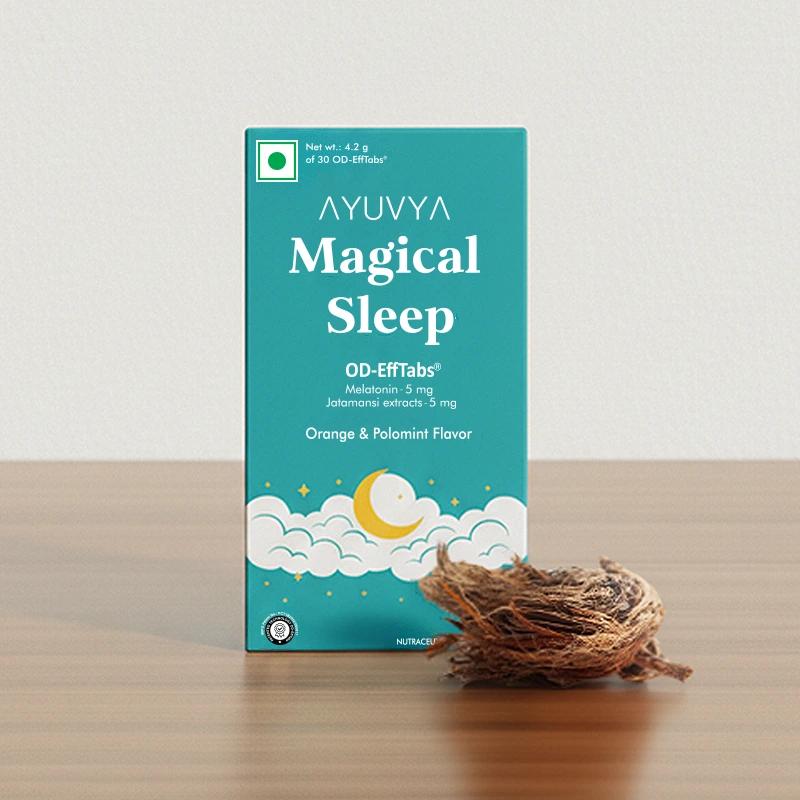Can’t sleep at night? Try these 3 Ayurvedic Habits Now
Nov 25, 2025

Sleep is the most wanted yet least acquired simple thing for most of us. You go to bed, carrying the full day's fatigue, and your brain just does not switch off. The to-do list keeps spinning, and before you know it, it is 2 a.m. again. If this happens to you, then you are certainly not the only one. But the good news is that you do not have to take any high-tech gadgets to make your sleep right. If you are looking for effective natural remedies for deep sleep, Ayurveda, the ancient Indian science of life, has come up with simple and time-tested remedies that help the body and mind regain their natural rhythm.
Table of Contents:
- Understanding Sleep through Ayurveda
- Why We Struggle to Sleep?
- Ayurveda's Path: Dosha Balancing
- Ayurvedic Remedies to Sleep Naturally
- A Bedtime Routine
- Final Thoughts
- FAQs
Understanding Sleep through Ayurveda
From Ayurveda's perspective, sleep is the second most important thing after food and discipline because it is one of the three pillars supporting health. Without good sleep, everything including digestion, emotions, and concentration starts to wobble.
Ayurveda explains that during sleep the body receives nature's restorative balance. During deep sleep, tissues are repaired, hormones are regulated, and the mind is refreshed. In other words, sleep is medicine, but a natural one.
Why We Struggle to Sleep?
The body’s natural rhythm is altered by unusual sleeping hours and missed meals.
Bad eating habits: Consuming caffeine, sugar, or very spicy food just before sleep can disturb the stomach and make it harder to fall asleep.
Mental pressure: Nerves and fears contribute silently to sleep loss. They are part of our daily lives, and when they accumulate, they produce an internal imbalance. This is the moment for Ayurveda to come in.
Ayurveda's Path: Dosha Balancing
According to Ayurveda, there are three doshas: Vata, Pitta, and Kapha. Vata corresponds to the body energy of movement, Pitta to metabolism, and Kapha to growth and tissues.
Vata, being composed of air and space, in excess leads to anxiety, restlessness, and insomnia.
Pitta, made of fire and water, can cause irritability, shallow sleep, or very vivid dreams.
Kapha, composed of earth and water, when heavy, makes one feel lethargic or sleep a lot without feeling recharged.
Proper sleep requires the natural and gentle balancing of these doshas.
Ayurvedic Remedies to Sleep Naturally
The Ayurvedic system of medicine prefers slow healing rather than quick fixes. It nourishes the nerves, calms the mind, and pacifies the entire being.
Herbal Helpers: Daily intake habits
Ashwagandha: The Stress Reliever
Ashwagandha, or Indian Ginseng, naturally relieves stress and induces deep relaxation. Drinking warm Ashwagandha milk just before bed helps you relax and positively impacts sleep cycles.
Brahmi: It Soothes the Mind
If your mind is overthinking at night, Brahmi can help. It calms mental activity, which is often the reason for restless thoughts. A cup of Brahmi tea signals your mind that it is time to sleep.
Jatamansi: The Natural Sedative
This herb with an earthy aroma relaxes the mind and gently carries you into sleep. Taking Jatamansi powder with honey before bed is recommended.
Tagar: The Soothing Root
Tagar, a relative of valerian, reduces mental strain and helps those who wake up multiple times during the night. It is considered one of the most effective sleep herbs in Ayurveda.
Home remedies for better Sleep: Nutrition and Bedtime Habits
Ayurveda states that food is energy, and the last meal of the day determines sleep quality.
It is better to eat light and early meals. Heavy, spicy, or oily dinners should be avoided. Instead, eat khichdi, soup, or steamed vegetables.
Caffeine, alcohol, and sugar-laden desserts should not be consumed near bedtime.
A classic and effective home remedy for a good night sleep is a cup of warm milk.
The main causes of insomnia are mental stress, physical strain, emotional tension, and overactive thinking. Common triggers include worry, overstimulation, excessive activity, discomfort, and disturbing dreams.
Herbal teas such as chamomile, tulsi, and cinnamon are excellent to drink before bed.
Relaxing Lifestyle Habits
Abhyanga: Oil Massage
A nerve-soothing oil massage relaxes the body and improves blood circulation.Aromatherapy
Scents like lavender, sandalwood, and vetiver create a peaceful mood. You may use a diffuser or place a drop on your pillow.Breathing (Pranayama)
Techniques such as Nadi Shodhana, alternating nostril breathing, balance the mind, lower the heartbeat, and calm the body.Digital Detox
It is best to stop using screens at least half an hour before bed. Then turn off lights and let your eyes adjust to darkness.
A Bedtime Routine
A bedtime ritual signals the body to sleep. An easy Ayurvedic routine includes:
Taking a warm shower or light oil massage
Drinking Ashwagandha or nutmeg milk
Meditating or deep breathing for 5 to 10 minutes
Writing a note of gratitude to release thoughts
Ensuring your bedroom is cool, quiet, and dark
Doing this every night helps your body recognize these signals as relaxation.
Final Thoughts
Sleep is a priceless and heavenly period when the body recovers, energizes, and prepares for the following day. According to Ayurveda, sleep is only truly restful if the mind is at peace.
Tonight, instead of watching one more video, light a candle, sip warm milk with nutmeg, and take deep breaths to let your body experience natural relaxation.
For the best supplements for better sleep, Ayuvya Magical Sleep tablets are a gentle, natural option and a superior alternative to other healthy sleep supplements.
Frequently Asked Questions
Using them together may cause side effects and is not recommended unless prescribed by a doctor
Warm milk with nutmeg, turmeric, or Ashwagandha is ideal because it calms Vata and promotes sleep.
Most are safe, but consult a doctor if you are pregnant, nursing, or taking medications.
Signs of relaxation may appear within the first week, but permanent changes typically occur after 2 to 4 weeks of daily practice.
Ayurveda addresses root causes by balancing doshas, reducing stress, and correcting sleep patterns. Regularity is very important.















